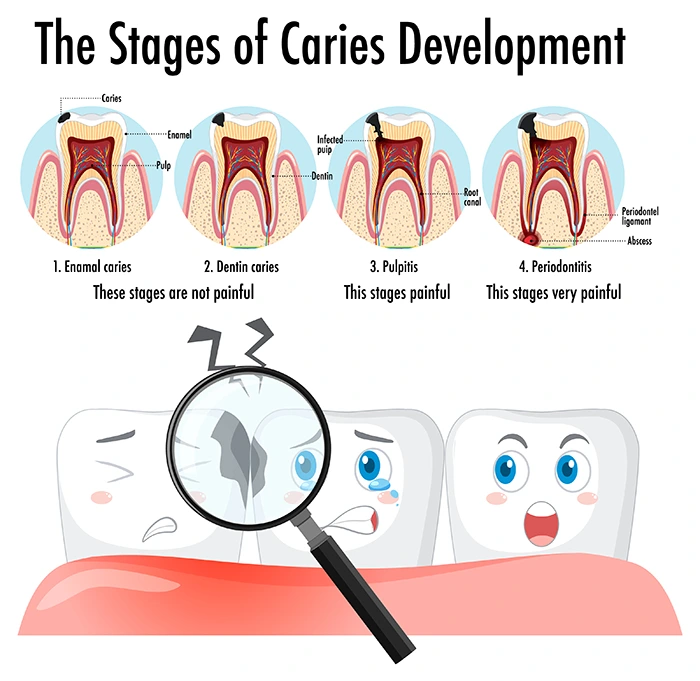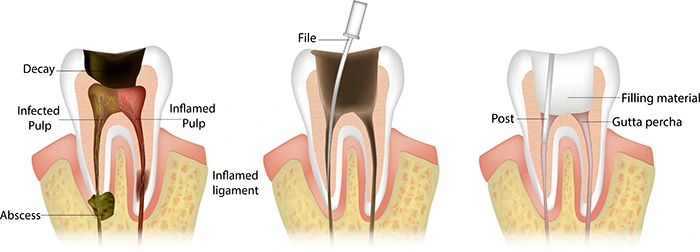OUR SERVICES
Root Canal Treatment in Dumont, NJ
Your teeth consist of three layers:
- Enamel
- Dentin
- Dental Pulp
Tooth enamel is the hard, fairly transparent, outer layer of the tooth, designed to protect the dentin and the pulp. In fact, it is harder than your bones, which means it is the hardest substance in your body. However, despite its durability, things like acids from foods and beverages you consume, bacteria, and plaque can cause it to break down.
When the enamel breaks down, the second layer- the dentin- is accessible to bacteria, plaque, and other substances. This layer is also harder than your bones and gives your teeth their color. Typically, this is a pale yellow but can range from grey to black. When this layer is damaged, you experience tooth sensitivity. Damage to the dentin layer exposes the dental pulp to external factors.
The dental pulp is the inner, soft core of your tooth that extends into the tooth roots, known as the root canal. This is where the nerves, blood vessels, and connective tissue are located. Once the decay reaches this layer, it can become inflamed and/or infected.
Many patients feel that extraction is their best- and sometimes only- option when a tooth is damaged/decayed to this point. However, at Palisades Dental Care, we believe that it’s best to take steps to salvage the natural tooth when possible. We recommend root canal treatment to remove the decay and save the natural tooth structure. Extraction should only be considered when all other options are out.
Here is what you need to know about root canal treatment:
What is a Root Canal?
The root canal is the internal area of the tooth where the dental pulp is located. This is where the blood vessels and nerves are located. When the tooth is damaged, the pulp is exposed to bacteria. This can result in infection. If not addressed in a timely manner, the infection may spread to other areas of the body.
Root canal treatment removes the damaged/decayed dental pulp to salvage the structure of the natural tooth. Research from the American Association of Endodontists indicates that dental professionals perform over 15 million root canal procedures every year, which equates to over 41,000 per day. In the past, this treatment was fairly painful and sometimes required an extended recovery time. However, thanks to advances in anesthesia and other dental technology, this procedure is no more painful than any other one.

What can cause the pulp of a tooth to be exposed?
There are a few things that can cause dental pulp to be exposed:
Tooth decay/cavities
– tooth decay/cavities start on the outer layer of the tooth. Left untreated, it can spread into the middle layer of the tooth and eventually into the dental pulp.
Trauma
– trauma to the face can cause teeth to crack, chip, or break. Depending on the severity of the injury, this can expose the dentin and ultimately the dental pulp.
Bruxism
– tooth grinding can cause the enamel and dentin to wear away, or can cause the tooth to crack, which exposes the dental pulp.
Aggressive tooth brushing
– while brushing your teeth is a good thing, if you are aggressive with your brushing or you regularly use an abrasive toothpaste, you may damage the enamel and dentin, exposing the dental pulp.
Root Canal Treatment Explained

Root canal treatment is the process of removing the infected dental pulp to salvage the structure of the natural tooth. The dentist will first administer local anesthesia to numb the area around the affected tooth. Sedation options may also be offered for patients who have dental anxiety or cannot remain still for an extended period of time.
Once the anesthesia has taken effect, the dentist will drill a small hole in the affected tooth to remove the pulp. After the infected pulp has been removed, the tooth will be disinfected to ensure that there is no infection or bacteria left behind.
The canals will be filled with gutta-percha, which will support the structure of the tooth from the inside. A dental filling will be used to seal the tooth. While not required, often a dental crown will be recommended to further protect the tooth. The restoration will last much longer with a dental crown than without.
How long does root canal treatment take?
The location and complexity of the affected tooth determine treatment time. However, you can expect to spend about 3 hours in the office from start to finish.
Front teeth are easier to access and usually only have one root. Therefore, these usually take less time than molars, which are in the back of the mouth and often have several roots.
The average treatment times are as follows:
- Front teeth: approximately 45 minutes to an hour
- Premolars: approximately an hour or more depending on the complexity of the tooth
- Molars: approximately 90 minutes or longer, depending on the complexity of the tooth
These times only include the root canal procedure itself. This does not consider placing a dental crown.
How long does recovery from root canal treatment take?
Root Canal Cost and Benefits
The cost of root canal treatment depends on several factors:
- The location of the tooth
- The type of dental professional performing the procedure (general dentist vs. specialist)
- The location of the dental clinic
- Scheduled or emergency root canal treatment
- Whether you need a standard dental filling or a dental crown
- Dental insurance coverage
On average, treatment ranges from around $1,000 for a front tooth root canal to $1,600 for root canal treatment on molars. Most dental insurance plans will cover a portion of this procedure since it is restorative. However, if you do not have insurance or if it is not covered, ask about our financing options.
Does Root Canal Treatment Hurt?
In the past, this was one of the most painful dental procedures and often required an extended recovery period. This is why most people chose to simply have the affected tooth extracted. However, when you have a tooth removed, you begin to experience the complications associated with missing teeth.
According to research, only 17% of patients who have had root canal treatment describe it as painful. In fact, many patients are able to get right back to their normal routine on the same day.
Root Canal vs Extraction
When you have a toothache, you may feel like the best answer is to have the tooth extracted. This will get rid of the problem. However, dental experts recommend procedures designed to salvage the structure of the tooth because it’s healthier to keep all of your natural teeth for as long as possible.
In the past, many patients chose extraction because it was the cheapest and least painful option. However, thanks to advancements in dental technology and anesthesia, root canal treatments are no more painful than extraction- and the benefits of this procedure make it worth the cost.
Top 7 Signs you need a Root Canal

Research indicates that the signs that you may need root canal treatment vary from one patient to the next, depending on the type of bacteria. The only way to confirm your need for treatment is to schedule your consultation with the team at Palisades Dental Care. We have the experience and expertise to treat most dental issues for the entire family.
The top signs that you may need root canal treatment include:
Persistent pain
– the pain may be constant or intermittent, and ranges from very mild to severe. You may feel the pain only near the affected tooth or it may radiate into your jaw, face, or other teeth.
Sensitivity to heat/cold
– sensitivity can range from a dull ache to a sharp pain, usually only felt near the affected tooth. Often, it lingers even after you are no longer exposing the tooth to the cause.
Pain when touched
– if you have pain when touching the tooth or eating something indicates that you may have significant tooth decay and/or nerve damage
Discoloration
– as the dental pulp is broken down by bacteria, it becomes necrotic, which causes the tooth to develop a dark gray color.
Swollen gums
– swelling is the result of the acidic waste products from the necrotic tissue. It may be constant or intermittent and may be tender when touched or you may feel no pain at all. Some patients develop an abscess, or pimple, on the gumline near the affected tooth.
Chipped/cracked tooth
– if a tooth is chipped or cracked, the inner layers of the tooth are exposed to bacteria, which increases your risk of infected dental pulp.
Tooth mobility
– when a tooth is infected, it often feels loose.
If you are experiencing any of these symptoms, schedule your root canal treatment consultation with Palisades Dental Care today. Even if you’re not experiencing problems, if it’s been a while since you visited a dentist, now is a good time. You should be visiting the dentist every 6 months for an exam and cleaning to keep your teeth healthy and strong.

